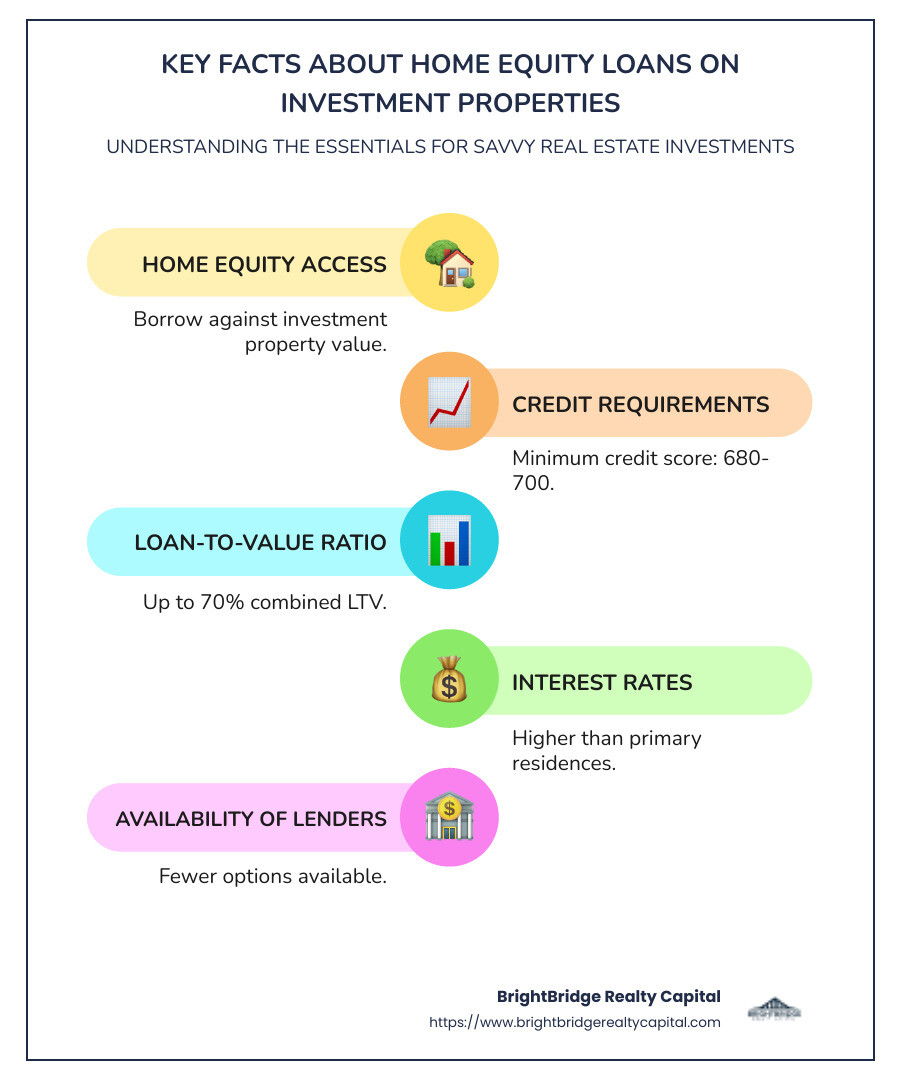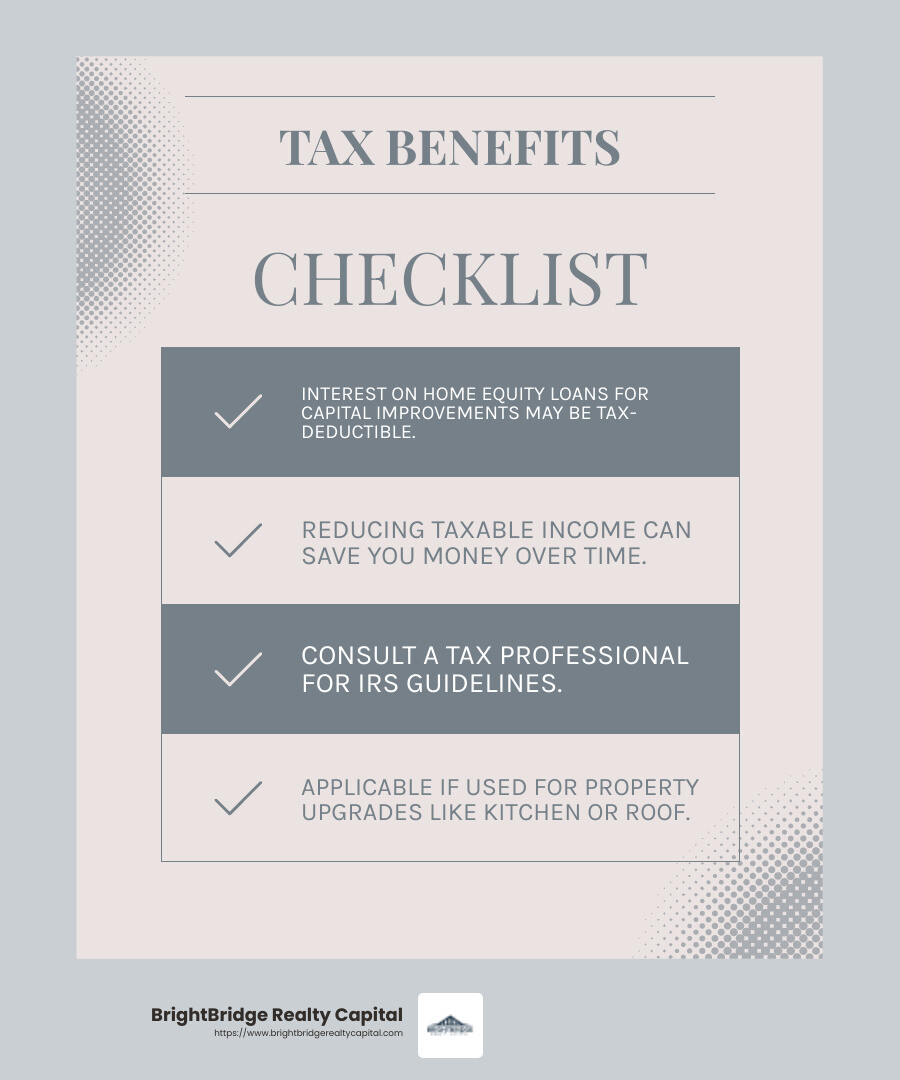Equity Unleashed: Financing Investment Properties with Home Equity Loans

Home equity loans on investment properties are becoming a key tool for savvy real estate investors looking to open up the equity locked in their properties. These financial instruments allow you to borrow against the value of your investment property, providing funds for renovations, expansions, or new acquisitions.
Quick Facts:
- You can get a home equity loan on an investment property, but expect stricter criteria.
- Credit Score: Minimum 680-700.
- Loan-to-Value: Up to 70% combined LTV.
- Interest Rates: Generally higher than for primary residences.
- Lenders: Fewer options, but some major banks and credit unions offer these loans.
In the busy real estate market, having access to immediate and flexible financing solutions can set successful investors apart. Whether you are planning a fix-and-flip project or expanding your rental portfolio, understanding how to leverage home equity loans can significantly improve your investment strategy.

Home equity loans on investment properties vocab explained:
- investment property loans with no down payment
- refinancing investment property loan
- llc loans for investment properties
Understanding Home Equity Loans on Investment Properties
When it comes to home equity loans on investment properties, there are a few critical factors to understand: credit score requirements, loan-to-value ratios, and interest rates. These elements can significantly impact your ability to secure a loan and the overall cost of borrowing.
Credit Score Requirements
Lenders see investment properties as riskier than primary homes. Why? Because if you're in financial trouble, you're more likely to stop paying the mortgage on a rental property than on your own home. That's why lenders usually require a higher credit score for these loans.
To qualify, you'll typically need a credit score between 680 and 700. Some lenders might work with scores as low as 620, but expect higher interest rates if you fall into this category.
Loan-to-Value Ratio
The loan-to-value (LTV) ratio is another crucial consideration. This ratio determines how much you can borrow based on your property's value.
For investment properties, lenders generally allow a maximum LTV of 70% to 80%. This means if your property is valued at $200,000, you could potentially borrow up to $140,000 to $160,000. Lower LTV ratios are more common for investment properties compared to primary residences, where LTVs can reach up to 90%.
Interest Rates
Interest rates for home equity loans on investment properties are typically higher than those for primary homes. This is due to the increased risk associated with investment properties.
Expect rates to be 1% to 2% higher than those for primary residences. While this might seem steep, the interest paid on these loans may be tax-deductible if used for property improvements. Always check with a tax professional to understand the potential benefits.
Understanding these factors can help you prepare for the application process and improve your chances of securing a favorable loan. With the right approach, home equity loans on investment properties can be a powerful tool in your real estate investment strategy.

Benefits of Using Home Equity Loans for Investment Properties
Home equity loans on investment properties offer several compelling benefits, making them a popular choice for savvy investors. Let's explore the key advantages, such as tax benefits, flexible funding, and renovation financing.
Tax Benefits
One of the standout advantages of using a home equity loan is the potential for tax benefits. If you use the loan for capital improvements on your property—like upgrading a kitchen or adding a new roof—the interest you pay might be tax-deductible. This can significantly reduce your taxable income, saving you money in the long run. However, it's important to consult with a tax professional to understand the specific IRS guidelines that apply to your situation.

Flexible Funding
Home equity loans provide flexible funding options, which can be invaluable for real estate investors. Unlike other types of loans, a home equity loan gives you a lump sum that you can use as you see fit. Whether it's purchasing additional properties or covering unexpected expenses, this flexibility can help you seize investment opportunities as they arise.
Renovation Financing
Investing in property improvements can increase your rental income and property value. A home equity loan is an excellent way to finance these renovations. By using the loan to improve your property, you're not only enhancing its appeal but potentially boosting its market value. This can lead to higher rental rates and a better return on investment.
In conclusion, home equity loans on investment properties offer a range of benefits that can help investors maximize their financial potential. From tax advantages to flexible funding and renovation financing, these loans can be a strategic tool in building your real estate portfolio.
Challenges and Considerations
While home equity loans on investment properties offer many benefits, they also come with their own set of challenges. Let's explore some key considerations, including stricter requirements, higher costs, and fewer lenders.
Stricter Requirements
Lenders view investment properties as riskier than primary residences. This perception leads to stricter requirements for borrowers. For example, you'll need a higher credit score—typically at least 720—to qualify. Additionally, the loan-to-value (LTV) ratio is lower for investment properties. Expect an LTV of around 70% to 80%, compared to up to 90% for primary homes. This means you can borrow less relative to your property's value.
Higher Costs
Due to the increased risk, lenders often charge higher interest rates for home equity loans on investment properties. You might also encounter shorter loan terms, generally between 10 to 15 years. This can lead to higher monthly payments compared to loans on primary residences, which often have terms up to 30 years. These factors combine to make these loans more expensive overall.
Fewer Lenders
Finding a lender for a home equity loan on an investment property can be more challenging. Many financial institutions, including some major ones, don't offer these loans due to the perceived risk. This limited availability can make it harder to shop around for the best rates and terms, potentially increasing your costs even further.
Understanding these challenges is crucial when considering a home equity loan for your investment property. By preparing for stricter requirements, higher costs, and a smaller pool of lenders, you can make a more informed decision and potentially steer these problems more effectively.
Alternatives to Home Equity Loans on Investment Properties
If a home equity loan on investment properties doesn't suit your needs, don't worry. There are other options available that might be a better fit for your financial situation. Let's explore some popular alternatives: HELOCs, cash-out refinance, and personal loans.
HELOC
A Home Equity Line of Credit (HELOC) offers flexibility that a traditional loan does not. Think of it like a credit card; you can borrow as needed, up to a set limit. This makes it great for covering ongoing expenses or renovations.
Key Features of HELOCs:
- Revolving Credit: Borrow what you need, when you need it.
- Interest-Only Payments: During the initial draw period (often 5-10 years), you might only pay interest.
- Variable Rates: Be prepared for fluctuating interest rates, which can affect your monthly payment.
Pros: Flexibility and interest-only payments can ease cash flow.
Cons: Variable rates can lead to unpredictable payments.
Cash-Out Refinance
With a cash-out refinance, you replace your existing mortgage with a new, larger one. The difference between the old and new mortgage is given to you in cash, which you can use for various purposes.
Key Features of Cash-Out Refinance:
- Single Loan: Combines your existing mortgage with additional funds.
- Fixed or Variable Rates: Choose based on your preference for stability or potential savings.
- Longer Terms: Often allows for longer repayment terms compared to HELOCs.
Pros: Potentially lower interest rates than other loans.
Cons: Extends your mortgage term and increases your total debt.
Personal Loans
Sometimes, a personal loan can be the quickest way to get funds, especially if you face urgent expenses. These loans are unsecured, meaning they don't require your property as collateral.
Key Features of Personal Loans:
- Fast Approval: Often quicker to get than other loan types.
- No Collateral Needed: Your property isn't at risk if you default.
- Fixed Rates and Terms: Know exactly what you'll pay each month.
Pros: Speed and no risk to your property.
Cons: Higher interest rates and lower borrowing limits compared to secured loans.
Each of these alternatives offers different benefits and drawbacks. Consider your financial situation and goals carefully to decide which option aligns best with your needs.
Frequently Asked Questions about Home Equity Loans on Investment Properties
Can you get a home equity loan on an investment property?
Yes, you can get a home equity loan on investment properties, but it's not as straightforward as getting one on your primary residence. Lenders consider investment properties riskier, meaning they apply stricter criteria.
Eligibility Criteria:
- Credit Score: Typically, you need a credit score of 700 or higher.
- Debt-to-Income (DTI) Ratio: Should be 43% or less, although some lenders might allow up to 50%.
- Equity: You must have at least 20% equity in the property.
These requirements ensure that you have a solid financial profile, which reassures lenders about your ability to repay the loan.
What is the loan-to-value ratio for investment properties?
The loan-to-value (LTV) ratio is crucial when applying for a home equity loan on investment properties. It determines how much you can borrow against your property's value.
LTV Requirements:
- Maximum LTV: Generally, lenders allow an LTV of up to 75% for investment properties. This means you can borrow up to 75% of the property's appraised value, minus any existing mortgage balance.
Having a lower LTV indicates more equity in your property, making you a more attractive borrower to lenders.
Are home equity loan interests tax-deductible for investment properties?
The tax benefits of home equity loans can be a significant advantage, but they come with specific conditions.
IRS Guidelines:
- Interest Deductibility: To deduct the interest paid on a home equity loan, the funds must be used to "buy, build, or substantially improve" the investment property.
- Tax Cuts and Jobs Act: This act limits the total deductible mortgage interest to loans totaling $750,000 for joint filers and $375,000 for separate filers.
Always consult a tax professional to ensure you meet IRS guidelines and maximize your tax benefits.
Understanding these aspects can make navigating home equity loans on investment properties less daunting. Next, we'll explore BrightBridge Realty Capital's offerings, focusing on fast closings and customized solutions.
Conclusion
When it comes to home equity loans on investment properties, choosing the right partner is crucial. At BrightBridge Realty Capital, we specialize in providing customized real estate financing solutions that cater to the unique needs of investors like you.
Our standout feature is fast closings. We understand that in the world of real estate, time is money. That's why we offer quick, flexible funding, often closing deals in as little as a week. This speed and efficiency can make all the difference when you're trying to secure a property or need immediate funds for renovation.
Customized Solutions are at the heart of what we do. Every investor's strategy is unique, and we tailor our financing options to fit your specific goals and circumstances. Whether you're looking to renovate, expand, or diversify your portfolio, we have the expertise and resources to support your vision.
By choosing BrightBridge Realty Capital, you're not just getting a loan; you're gaining a partner committed to helping you succeed in your investment journey. Our direct lending approach eliminates intermediaries, offering you competitive rates and a seamless process.
Ready to take the next step in your real estate investment journey? Explore our customized solutions today and experience the difference that fast, flexible funding can make.


